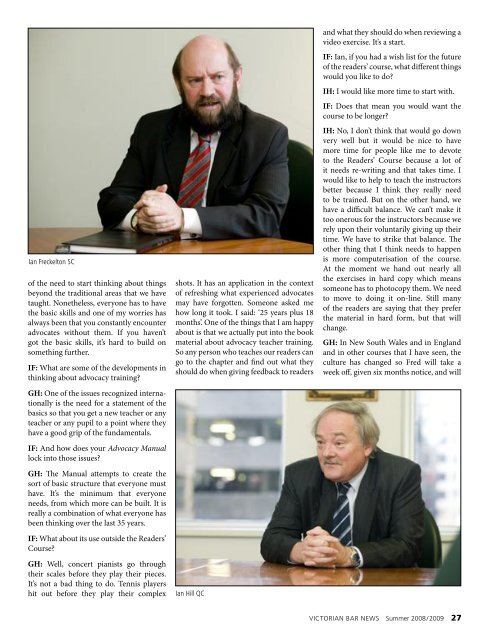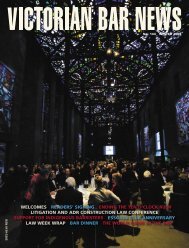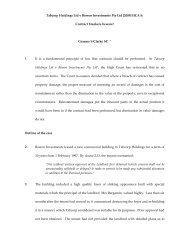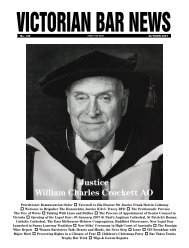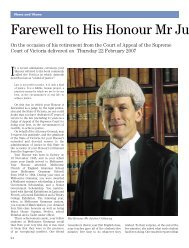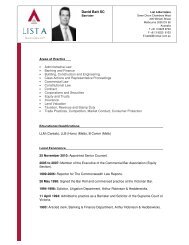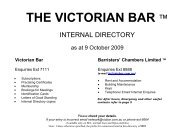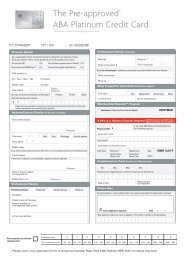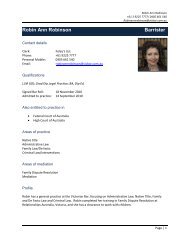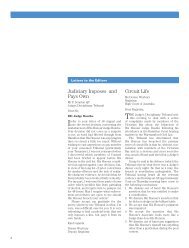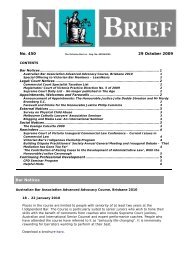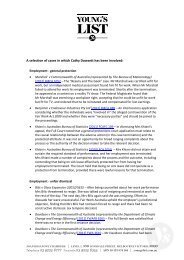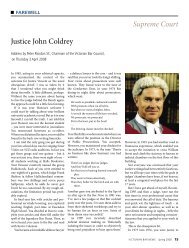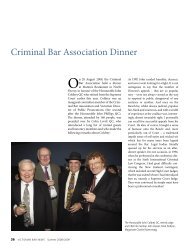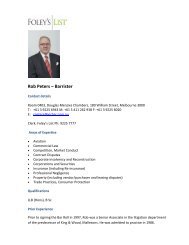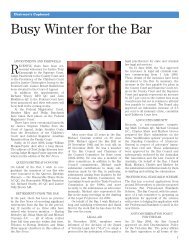Readers' Course revisited - Victorian Bar
Readers' Course revisited - Victorian Bar
Readers' Course revisited - Victorian Bar
You also want an ePaper? Increase the reach of your titles
YUMPU automatically turns print PDFs into web optimized ePapers that Google loves.
Ian Freckelton SC<br />
of the need to start thinking about things<br />
beyond the traditional areas that we have<br />
taught. Nonetheless, everyone has to have<br />
the basic skills and one of my worries has<br />
always been that you constantly encounter<br />
advocates without them. If you haven’t<br />
got the basic skills, it’s hard to build on<br />
something further.<br />
IF: What are some of the developments in<br />
thinking about advocacy training?<br />
GH: One of the issues recognized internationally<br />
is the need for a statement of the<br />
basics so that you get a new teacher or any<br />
teacher or any pupil to a point where they<br />
have a good grip of the fundamentals.<br />
IF: And how does your Advocacy Manual<br />
lock into those issues?<br />
GH: The Manual attempts to create the<br />
sort of basic structure that everyone must<br />
have. It’s the minimum that everyone<br />
needs, from which more can be built. It is<br />
really a combination of what everyone has<br />
been thinking over the last 35 years.<br />
IF: What about its use outside the Readers’<br />
<strong>Course</strong>?<br />
GH: Well, concert pianists go through<br />
their scales before they play their pieces.<br />
It’s not a bad thing to do. Tennis players<br />
hit out before they play their complex<br />
shots. It has an application in the context<br />
of refreshing what experienced advocates<br />
may have forgotten. Someone asked me<br />
how long it took. I said: ‘25 years plus 18<br />
months’. One of the things that I am happy<br />
about is that we actually put into the book<br />
material about advocacy teacher training.<br />
So any person who teaches our readers can<br />
go to the chapter and find out what they<br />
should do when giving feedback to readers<br />
Ian Hill QC<br />
and what they should do when reviewing a<br />
video exercise. It’s a start.<br />
IF: Ian, if you had a wish list for the future<br />
of the readers’ course, what different things<br />
would you like to do?<br />
IH: I would like more time to start with.<br />
IF: Does that mean you would want the<br />
course to be longer?<br />
IH: No, I don’t think that would go down<br />
very well but it would be nice to have<br />
more time for people like me to devote<br />
to the Readers’ <strong>Course</strong> because a lot of<br />
it needs re-writing and that takes time. I<br />
would like to help to teach the instructors<br />
better because I think they really need<br />
to be trained. But on the other hand, we<br />
have a difficult balance. We can’t make it<br />
too onerous for the instructors because we<br />
rely upon their voluntarily giving up their<br />
time. We have to strike that balance. The<br />
other thing that I think needs to happen<br />
is more computerisation of the course.<br />
At the moment we hand out nearly all<br />
the exercises in hard copy which means<br />
someone has to photocopy them. We need<br />
to move to doing it on-line. Still many<br />
of the readers are saying that they prefer<br />
the material in hard form, but that will<br />
change.<br />
GH: In New South Wales and in England<br />
and in other courses that I have seen, the<br />
culture has changed so Fred will take a<br />
week off, given six months notice, and will<br />
VICTORIAN BAR NEWS Summer 2008 / 2009 27


